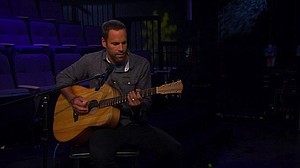9/19/2017

By Benjamin Bamsey, CNN
(CNN) -- If mellow was a movement, Jack Johnson would be its peaceful and eternal leader.
For the past 15 years, the former pro surfer-turned-acoustic guitar strummer has recorded the ultimate soundtrack to laid-back living from his home on the North Shore of Oahu in Hawaii. But in the age of Donald Trump, Johnson's aloha spirit may have soured a bit on his latest album "All the Light Above It Too."
Gone are the tracks about mango trees, constellations and banana pancakes. In their place are songs about fearful walls, hateful words and a "me first, gimme gimme appetite." It's seen as as a critique of the U.S. President in Johnson's single, "My Mind Is For Sale."
"One morning, I was just putting my thoughts down like, 'What was I going to tell my children?'" Johnson told CNN's John Vause. "The same person who I told them, 'This was all entertainment. Don't worry about it,' became the frontrunner and became the President of the United States. This one felt important to put out there. This song wrote itself."
"I heard those six or seven words he likes to use, are always in bad taste ... the elephant in the room begins to dance, the cameras zoom into his mouth begins to move, those hateful words he uses."
In the video, Johnson builds a lyrical wall and then knocks it over -— prompting ABC News music critic Allan Raible to write: "When Johnson gets angry, he often delivers his best work."
While the theme of that track may be different, the melody is signature Jack Johnson — smooth, coating the edgy message in silk.
"I'm not trying to write an anti-Trump song," Johnson said. "I've heard people call it that. Maybe it's anti-some of his ideas. If anything, it's a pro-love song. I try to look at something and instead of only tearing the thing down, you want to replace it with something positive. So to me, walls that divide us aren't a good thing. So it's more about being proactive and how to include people."
Johnson's album cover and the video for his second single, "You Can't Control It," also take on a big issue, tackling global pollution. The clip features a time-lapse of Johnson and his team collecting plastic on a Hawaiian beach and creating a colorful, yet mind-numbing mosaic out of the garbage that once floated in the ocean.
"The plastic fragments break down into little pieces that become the smog of the sea," Johnson said. "I was lucky to go on a trip through the North Atlantic Gyre where they're documenting how much plastic is in the ocean and doing the scientific work."
The trek led to a documentary film about the trillions of nearly invisible plastic shards making their way up the marine food chain. Johnson said he was so mortified by what he saw that he vowed to make his concerts plastic-free — and, he said, for the most part, they are.
"I couldn't step over the high tide to see that plastic, and then, see all the plastic at those shows and not make that connection that I matter. That's why we've begun the work to minimize that."
With Hurricanes Harvey, Irma and Maria doing so much destruction this summer, Johnson believes there's no point denying the science of climate change.
"There's coral bleaching all around the world and it's something I've seen growing up in Hawaii," he said. "I've seen the devastation to the reefs. To have a leader of our country pull out of the Paris Climate Agreement and gut the EPA — it's just heartbreaking and it's easy to look at the negatives, but it also seems to be motivating a lot of people to say, 'If my government is going to do anything about this, then, I'm going to get involved with a local nonprofit and put my future in my own hands.'"
The album isn't all political and social commentary, however. There are love songs — two of them written to his wife and another to the serenity of Big Sur. As Johnson describes it, the B-side of the album is like "driving away from all those things that can load up on your mind and weigh heavy on you. Big Sur is about escaping all of that. In the song, I refer to the lines of the road driving up — but it's also the lines of society that confine us. Big Sur is one of those places for me where you can find freedom."
One thing that hasn't changed is Johnson's approach to songwriting.
"I like to write love songs," he said. "They always feel the best. Sometimes I wonder, 'What does more to stop a war: an anti-war song or a pro-love song? What's the best thing you can do to combat hate, or anger and fear?' The answer is probably putting love into the air as much as you can. When people listen to a love song on the way to work and they feel better and they treat everybody better all day -- all that resonates by just putting a little more love in the world."
